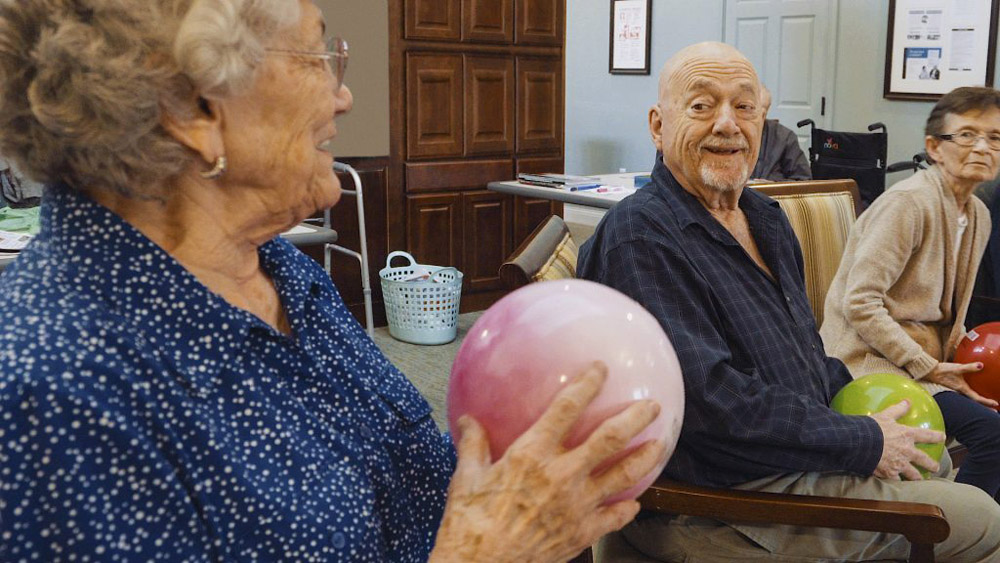Top Advantages of Memory Care: An Encouraging Environment for Seniors
Memory care facilities offer an organized and encouraging setting tailored particularly for seniors with cognitive impairments. These specialized settings not only boost security and safety but likewise offer customized care plans that accommodate private requirements. Engaging social tasks and experienced team add to boosted psychological health and cognitive excitement, cultivating a sense of area. As households seek peace of mind about their loved ones' health, the worth of these programs comes to be significantly obvious. However, comprehending the complete range of benefits calls for further exploration into how memory care genuinely transforms lives.
Boosted Safety and Security
One of one of the most considerable benefits of memory care centers is their enhanced safety and security and safety and security attributes, created specifically to protect individuals with cognitive problems. These facilities focus on the wellness of locals by incorporating a selection of security measures that alleviate dangers related to straying and accidents. Safe and secure settings commonly consist of kept an eye on entrance and departure factors, making sure that citizens can not leave the premises without supervision, which significantly minimizes the danger of obtaining shed or experiencing unsafe situations.Additionally, memory care facilities are furnished with emergency situation action systems, such as call buttons and alert systems, enabling homeowners to swiftly seek help when needed. Team member are trained to identify the one-of-a-kind obstacles faced by individuals with memory-related problems, enabling them to respond promptly and properly to emergencies.Moreover, these facilities typically include layouts that reduce complication, with clear signs and acquainted setups that help in navigation. The presence of qualified caretakers all the time additionally boosts homeowners' safety, providing reassurance to both individuals and their families. In general, the complete safety and security and protection procedures in memory care centers produce a helpful ambience where homeowners can grow while decreasing potential risks.

Personalized Care Program
Because each individual with memory impairment has one-of-a-kind needs and difficulties, individualized care strategies are an essential part of effective memory care. These customized plans are diligently crafted by a team of health care experts, including physicians, nurses, and caretakers, who team up to assess the particular demands of each citizen - Alzheimer’s Care Charlotte. By focusing on private choices, case history, and cognitive capabilities, customized care strategies assure that residents receive the suitable level of support.A crucial aspect of these strategies entails normal analyses and changes based on the homeowner's altering condition. This vibrant technique enables caretakers to change interventions, therapies, and daily routines, thereby making best use of the effectiveness of care. Additionally, personalized care strategies boost the lifestyle for residents by integrating their interests and promoting freedom, enabling them to take part in tasks that resonate with their individual histories.The implementation of these strategies cultivates a feeling of protection and trust, as residents and their family members really feel positive that their certain requirements are being dealt with. Ultimately, personalized care plans not just support the physical well-being of people with memory disability but additionally contribute meaningfully to their emotional and emotional health and wellness, producing an all natural care setting
Engaging Social Activities
Involving social tasks play an important role in boosting the general well-being of people with memory impairment, complementing the individualized care plans created for their distinct needs. These tasks foster connections amongst homeowners, offering possibilities for socialization, which is important for psychological health and wellness and cognitive stimulation.Participating in team activities can help in reducing sensations of isolation and solitude that lots of seniors experience. Structured experiences, such as art courses, songs treatment, or reminiscence sessions, encourage not just communication yet likewise the expression of creativity and individuality. Such communications can greatly enhance state of mind and rise overall life satisfaction.Moreover, engaging social tasks can boost cognitive function by promoting psychological interaction and emphasis. Gamings, puzzles, and seminar challenge locals' thinking skills and memory recall, assisting to preserve cognitive abilities for as long as possible.Additionally, these activities often include physical activity, which is advantageous for general health. Mild exercises or dance can improve physical well-being while fostering a sense of neighborhood amongst individuals.
Specialized Memory Support
Specialized memory assistance is essential for individuals facing cognitive challenges, as it addresses their one-of-a-kind requirements with tailored interventions and approaches. This specialized care focuses on various kinds of memory problems, consisting of Alzheimer's disease and other mental deteriorations, ensuring that each resident receives the attention and solutions required for their certain condition.Key aspects of specialized memory support include customized care strategies, which are established through extensive evaluations of specific capacities and preferences. These strategies might include cognitive treatments designed to boost memory retention, interaction, and daily living skills. Furthermore, employee in memory care centers are trained to utilize efficient interaction methods and behavioral administration techniques that cultivate an encouraging environment. Dementia Care.Furthermore, specialized memory support typically incorporates structured regimens and interesting tasks that promote cognitive stimulation and social interaction. This not just enhances the lifestyle for citizens yet likewise helps to reduce stress and anxiety and complication related to cognitive decrease. By prioritizing a compassionate and comprehending technique, specialized memory assistance creates an atmosphere where people can thrive regardless of their difficulties, ultimately bring about improved psychological wellness and a sense of function in their day-to-days live
Family Peace of Mind
For families of people with cognitive problems, the peace of mind that comes from understanding their loved ones are getting specialized care can be important. Memory care centers offer a safe and secure atmosphere tailored to the special needs of senior citizens with Alzheimer's, mental deterioration, and various other cognitive challenges. This specific care permits families to feel certain that their loved ones are in capable hands, benefiting from experienced team who comprehend the intricacies of memory-related conditions.The structured regimens and appealing tasks offered in memory care settings not only enhance the lifestyle for citizens yet additionally relieve the tension and fret normally experienced by member of the family. Knowing that their loved ones are taken part in purposeful interactions and getting individualized focus can considerably reduce anxiousness for families.Additionally, memory care facilities typically provide families with resources and assistance, consisting of therapy and curricula. This equips family members to better comprehend their loved one's condition and navigate the difficulties connected with it. Inevitably, the mix of expert care, a nurturing atmosphere, and family sustain promotes a sense of safety and security, index allowing family members to focus on treasuring their time together without the burden of consistent fear.
Frequently Asked Inquiries
What Credentials Do Memory Care Personnel Participants Normally Have?
Memory care staff members normally possess specialized qualifications to efficiently sustain people with cognitive disabilities. The majority of have completed training in dementia care, frequently holding certifications in gerontology or a relevant area. Additionally, numerous staff participants have backgrounds in nursing, community service, or psychology, enabling them to supply substantial emotional and physical support. Continuous education and learning in the most recent care techniques is also common, making sure staff stay educated about ideal practices in memory care.

Exactly How Do Memory Care Facilities Manage Medical Emergency Situations?
Memory care centers are furnished to manage medical emergencies via trained staff and well-known protocols. Employee commonly get training in very first help, CPR, and particular treatments for taking care of wellness dilemmas connected to cognitive impairments. Boutique Memory Care Charlotte. Facilities often team up with local clinical solutions to assure fast feedback times - Dementia Care. Additionally, they maintain considerable health records for locals, enabling speedy recognition of medical needs and proper interventions during emergency situations, thus guaranteeing citizens' wellness and safety
Are Visitors Allowed at Any Time in Memory Care?
Visitation policies in memory care facilities differ by establishment. Normally, a lot of centers motivate friends and family to check out locals, fostering connection and support. Certain going to hours might be executed to assure the safety and security and well-being of all citizens. Facilities typically focus on structured communications to reduce disturbances to everyday regimens and restorative tasks. It is advisable for visitors to contact the facility concerning their specific visitation guidelines and any type of prospective constraints.
What Kinds of Therapies Are Used in Memory Care Communities?
Memory care areas typically use a selection of healing interventions tailored to sustain people with cognitive problems. Typical therapies include cognitive stimulation treatment, art and songs therapy, and memory therapy, which motivate involvement and emotional expression. In addition, physical treatment might be given to enhance mobility, while work-related treatment concentrates on everyday living skills. These structured activities aim to promote cognitive feature, improve state of mind, and foster social links amongst homeowners, creating a holistic technique to care.

How Is Drug Administration Conducted in Memory Care?
Drug monitoring in memory care neighborhoods is performed through an organized strategy to guarantee the safety and security and health of residents. Educated team member oversee the administration of drugs, adhering to prescribed does and routines. Regular evaluations are carried out to check efficiency and possible side impacts. Additionally, caretakers maintain clear communication with doctor and households, assuring that any type of adjustments in health and wellness condition are promptly resolved, thus maximizing the overall care process for individuals with cognitive problems.